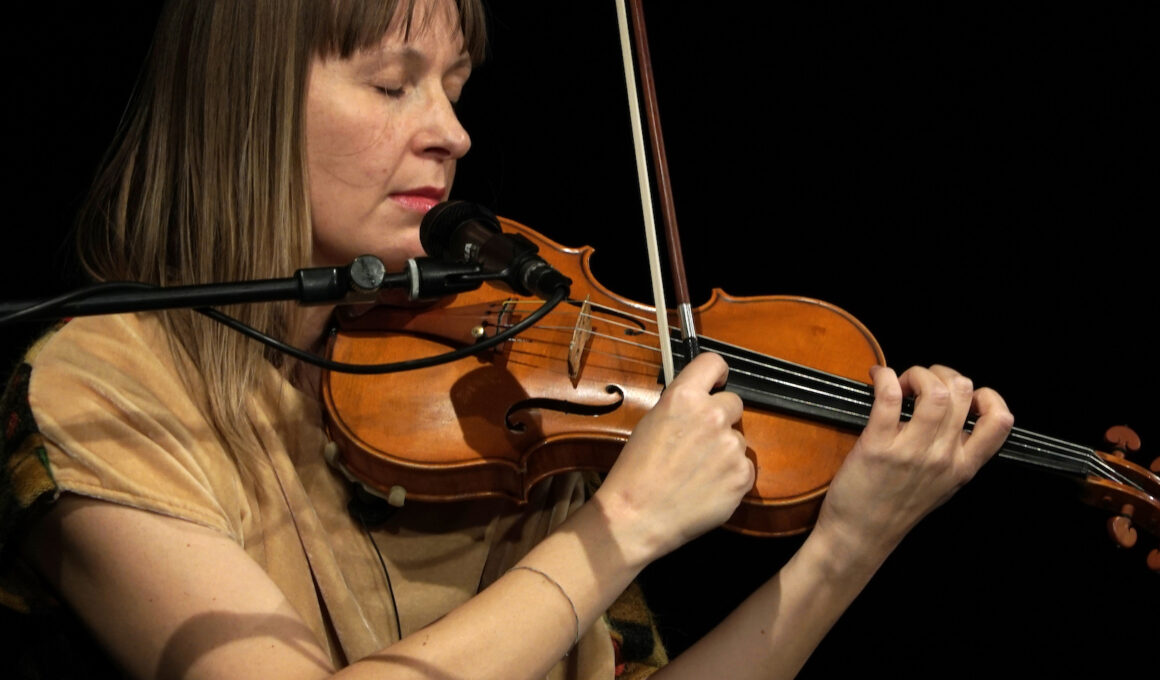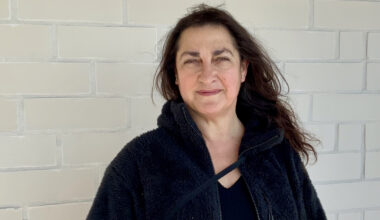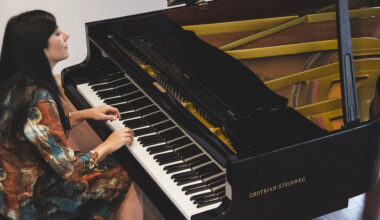Silvia Tarozzi is a violinist, improviser, composer and singer based in Italy. For more than twenty years she has dedicated herself to a large palette of contemporary music languages, developing a personal sound world. As a performer her musical research on violin find expression in several collaborations with composers as Éliane Radigue, Pauline Oliveros, Pascale Criton, Cassandra Miller, Martin Arnold, Pierre-Yves Macé, Philip Corner.
Her own music stems from a creative process of deliberate overcoming of canonical musical genres. Her songs and compositions manifest it through a wide palette of sounds and references, from folk, to chamber music, from contemporary to pop music.Her concerts have been recorded and broadcasted by BBC Radio and France Musique and her music projects are released by New World Records, I dischi di Angelica, Potlatch, Unseen Worlds.
In 2020 the NY label Unseen Worlds released her first song’s album “Mi specchio e rifletto” which has been positively reviewed by Pitchfork, The Quietus, The Wire, Artforum NY and others. In 2022 with Cassandra Miller she composed and performed “Bismillah meets the Creator in Springtime” for two soloists and the BBC orchestra (Tectonics Festival Glasgow).
She has a longstanding collaboration with the Italian cellist Deborah Walker with which she also takes part in the French Ensemble Dedalus, focused on contemporary experimental music.
FACTS
1. Violences in Iran against girls and women make me think to “Le 100 giornate di Sodoma” by P.P.Pasolini. They are killing the ones they should be most proud of, their most brave people, and they don’t even understand it.
2. The calendar in my room is stuck in September, my pc pretends it’s the 23rd of December. It’s 10am but last week I was in Madeira and now it was 9am. Few weeks ago I was in Chicago and now it was 3am…etc etc.
Is it a fact?
3. My piano is very out of tune. I love it.
QUESTIONS
1. What is the biggest inspiration for your music?
The desire to have a space and a mean to transform what I live, feel, think, intuit, experience, suffer, enjoy, what challenges me, what I can’t explain, what I’m looking for, what troubles me, in something else. Something that I can share and can eventually help me and others to change perspective.
2. How and when did you get into making music?
I started as a child singing songs and playing guitar and few years after I went to the Conservatory to learn violin and classical music.
3. What are 5 of your favourite albums of all time?
Probably the albums I listened when I was a teenager. And ones I haven’t heard yet.
Anyway 5 nice album that I enjoy to listen from the beginning to the end: Something Else! (Ornette Coleman), Vibrations (Albert Ayler and Don Cherry), La trilogie de la mort (Éliane Radigue), Pour Pier Paolo (Giovanna Marini and il quartetto vocale), The roots of the moment (Pauline Oliveros)
4. What do you associate with Berlin?
A big city with a difficult weather, an incredible cultural offer, beautiful people from everywhere in the world and some of the most broken junkies I’ve ever seen. But I went there only a couple of times.
5. What’s your favourite place in your town?
Let’s choose Bologna as my town, even if I don’t live there now. My favorite place is spread in the whole city centre: everywhere there are arcades on the streets. I ever loved to walk in that kind of urban gut that smells of the city and its inhabitants.
6. If there was no music in the world, what would you do instead?
Cry
7. What was the last record/music you bought?
Last week I was part of the jury of a competition for composers (actually a call for pieces for a specific ensemble) and I discovered some interesting music. On of my favorite was a piece for flute, bass clarinet, violin and cello (Gilgamesh Recitations) by Máté Balogh, a Hungarian composer. A piece of contemporary music that reminded me a lot of Kurtag. Not revolutionary but nice.
8. Who would you most like to collaborate with?
Robert Wyatt.
9. What was your best gig (as performer or spectator)?
I never think in terms of “the best” and I don’t have a good memory. But it comes to my mind a concert at AngelicA Festival in 2015 by Sidsel Endresen and Stian Westerhus. The project was called “Bonita” and they were playing sort of improvised songs I think. That performance I still have in mind: they were in a state of grace. Anyway that’s how I experienced it.
10. How important is technology to your creative process?
Not so much in terms of sound research, but practically I use technology to record and mix my music and this opens up possibilities that obviously influence my creative process a lot. The fact to can do it by myself makes me more active and independent when I record an album. Through midi instruments I can also experiment with combinations that would be very difficult to achieve with real instruments. This allows me to think about orchestrations broadly and freely.
11. What did you like most about the MADEIRADiG, what was your favourite moment?
I wish I could have spent more time in the island and at the Festival. But there was a magical moment when just before my concert (with Deborah Walker) we peeked into the rehearsal of the Ponta do Sol’s choir preparing their traditional Christmas carols. There was this large group of women and men of various ages singing and many of them also playing accordion, guitar or mandolin. All crammed into one room. And the song was beautiful and the sound was a biblical “joyful noise”.


